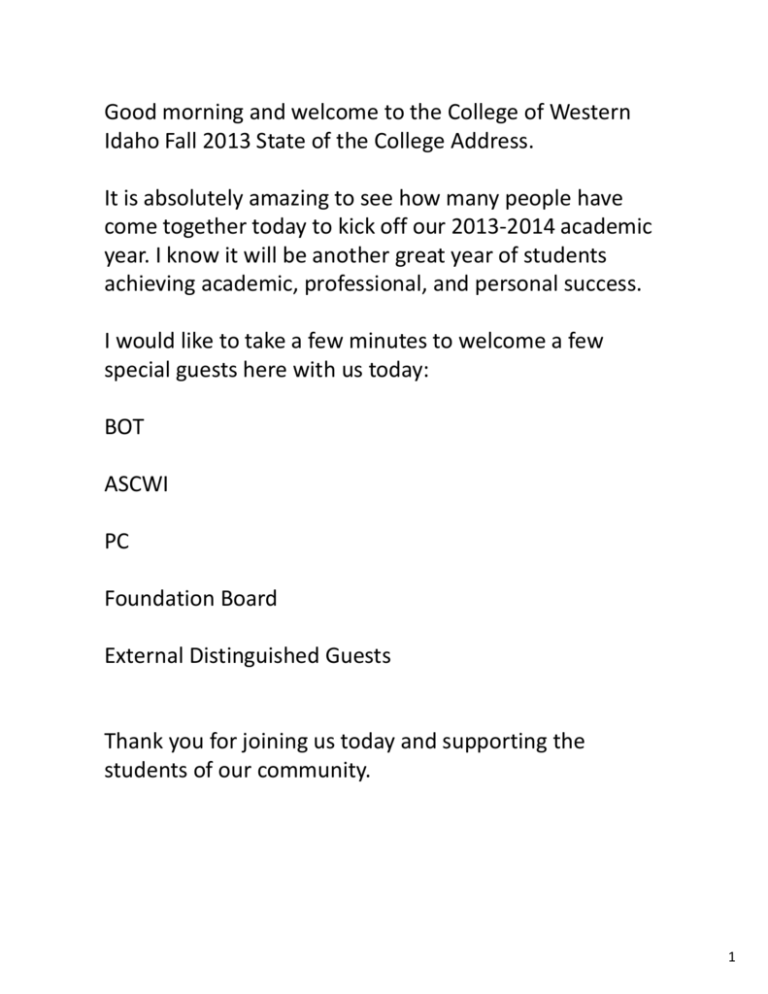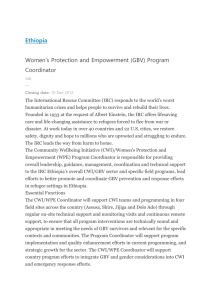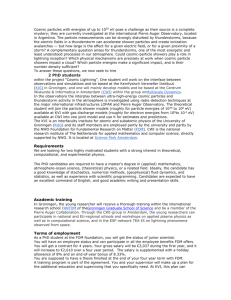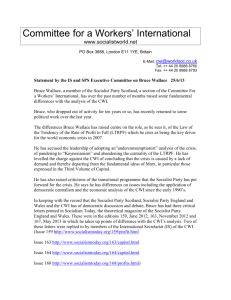What if - College of Western Idaho
advertisement

Good morning and welcome to the College of Western Idaho Fall 2013 State of the College Address. It is absolutely amazing to see how many people have come together today to kick off our 2013‐2014 academic year. I know it will be another great year of students achieving academic, professional, and personal success. I would like to take a few minutes to welcome a few special guests here with us today: BOT ASCWI PC Foundation Board External Distinguished Guests Thank you for joining us today and supporting the students of our community. 1 In addition to this fabulous group of supporters, we have several new employees joining us since our last address. Can I have everyone stand that is attending their first CWI address as an employee. We welcome you to CWI and are excited to have you a part of our ever‐growing community. 1 Before we get into the accomplishments of this last year and goals for the coming year, I would like to introduce you to one of the many students making an impact at CWI – Megan Carter, the Associated Student Government Vice President. Megan is a fourth semester student at CWI working towards a double major in anthropology and biology with a healthcare emphasis. Since joining ASCWI, she has worked to connect students to the college through a variety of activities. She has helped out all around campus through work with clubs, tutoring, and chairing the Board of Student Concerns and Inquiries. Her goal is to continue to build a strong student, faculty and administration interaction through increased communications. Please join me in welcoming Megan Carter. 2 College Just Got Real Last year we asked our students a few “what if” questions. This year we are asking some “what if’s” of ourselves. 4 What if a college’s top priority was student success? Helping students succeed in their pursuit of higher education is the reason CWI was created and the overarching goal that is weaved throughout every interaction that we have at CWI. Last year nearly 23,000 students came to CWI for educational support. This includes all of our degree seeking students, industry professionals, people seeking basic education, and community members simply needing to update specific skills. 777 students achieved associate degrees last year along with nearly 1,900 GED completers. Three student organizations – Speech and Debate, Business Professionals of America, and SkillsUSA – competed once again at the national level. And once again, claimed national championship titles and awards. These competitions provide recognition of the quality of education and skills our students are attaining and more importantly, these students are given an opportunity to share their passion and dedication. Our enrollment continued to remain strong and College of Western Idaho remains focused on our students and the impact we have on their lives and the success of our community! Today you will find a common frame of reference with regard to our present standing and future direction – student success. 5 As we will discuss throughout this address, student success starts with asking the tough questions on how we can: • create a solid foundation of programs and services, • ensure access to these services, • engage students early to build a strong pipeline to college, • continuously engage and support students throughout their college experience, • and develop the important connections with our community to ensure our students successfully transition on to the next phase upon completion of their program at CWI; whether that involves continuing education at a university or directly entering the workforce. 6 I would like to start our discussion on student success with an update on CWI’s accreditation status as this is a critical process for ensuring our college is meeting the required standards and following good practices that will help our students succeed beyond their time at CWI. As you know we are currently delivering college credit instruction, certificates, and degrees through a partnership with College of Southern Idaho. I am pleased to report that CWI’s quest for independent accreditation is going very well. Last year students were able to complete all of the enrollment steps including paying classes through CWI’s systems, and our year one report was accepted by the Northwest Commission on Colleges and Universities. Over this next year we will be continue our self‐assessments and improvements and prepare for the next visit which is anticipated to occur in fall of 2014. 7 Independent of our College Accreditation, we are thrilled to announce that the CWI Nursing program has been approved for initial accreditation with the Accreditation Commission for Education in Nursing. (lead applaud) Our nursing program has been producing exceptional students with highly desirable skills. We are thrilled to have received this National accreditation status and look forward to continuing to serve our community with affordable, quality educational offerings that support a strong workforce in the healthcare sector. 8 What if a college provided education that met community needs? 9 CWI provides a wide variety of learning opportunities and the right mix of programs. Our faculty and staff continuously review and evaluate all classes and programs to determine best practices and opportunities for varied delivery methods. CWI delivers over 50 credit programs and hundreds of short‐term training classes through traditional hands‐on classroom delivery, online, a mixture of the two, and flexible schedules to meet the student needs. Keeping our programs relevant and adding new industry sectors is critical to helping our students succeed. This year CWI plans to begin development of new programs for software development, Certified Medical Assistant, Advanced Manufacturing, and Light Duty Diesel. These programs will directly engage new industry sectors that allow CWI to broaden our community partnerships and create new opportunities for our students 10 What if a student could attend college any time, day, or week? This year we need to look at how we can be even more accessible by expanding options for attendance, beyond traditional scheduling. 11 Traditional, face‐to‐face class delivery will not go away – in fact they are a necessity for many of our programs that require hands‐on instruction with the faculty. However, CWI is embracing the increasing trend of our students preferring to take classes online. Last year we accounted for a 23% increase in students taking online classes which means 29% of our credit student population is now taking classes online. We expect this percentage to grow as we are able to add more classes and services. Seven of our degree programs have been approved by the Northwest Commission for full delivery online and we just recently welcomed a new online director, Jerry Scripture, to help advance our online offerings. 12 What if a college could help students make better financial decisions? We know that our students are living with financial challenges and we have an obligation to help our students understand the cost of college. Student loans have exceeded credit card debt in the US and we can help be a model for helping break that trend. 13 This year CWI kept the cost of credits at $136 because we know there is a great need in our community for affordable education. Last year more than 9,100 students received some disbursement of financial aid totaling more than $54.8 million in grants, scholarships, and student loans. This is up 8.6% from the previous year. With this increase CWI has implemented several initiatives to help advise students including the addition of expert Financial Aid Advisors coaching One Stop Student Services staff and acting as referral teams ready to help educate students on financial options and obligations. 14 What if a college delivered prep courses instead of remedial classes? This may sound merely like a change in vernacular, but the concept of preparing a student has less of a negative connotation than remedial or developmental references. 15 For students to succeed in college we need to help them build a good foundation through preparation activities. Our goal is to have confident and ready students entering every program. We must develop strong options to help strengthen the skillset of entering students. The numbers of students starting in developmental course upon entering college is unacceptable. In addition to the academic needs, students coming to college are lacking college readiness skills for time management, accessing resources, and study habits. In our strategic plan you will find several efforts focused on helping incoming students prepare for all aspects of the college experience. 16 To name just a few of these efforts, CWI has already implemented: • Open Community Learning Centers in conjunction with our Adult Basic Education program to support adult literacy guidance • Pre‐enrollment support through Orientation, Advising, and Registration sessions available to all incoming students – these will become mandatory in Fall 2014 • Creating bridge programs that support students moving from one program to the next as illustrated in our multicultural nurse assistant program • Information literacy collaboration between the library and communications department to make sure all Comm 101 students receive information on how to understand, evaluate, and effectively use information • And, this year CWI had it’s first pilot program for a Re‐ Boot Camp where 14 incoming students attended a five‐ week, intense training camp to improve their college readiness. I would like to show a quick clip of the results. 16 What if every graduating high school student had college credits? 18 CWI is reaching out to high schools in our service area and successfully strengthening our pipeline of high school students enrolling in dual credit and tech prep programs that provide college credit while in high school. Last year 1,253 high school students came to CWI through our Dual Credit program. This is an increase of 70% over the previous year. Our dual credit team is dedicated to reaching every high school student, including those attending alternative high schools. I would like to share a quick exert of a video that was created last year to highlight the success of one of these schools. 19 What if low graduation rates were no longer acceptable? CWI’s most recent graduation rate data shows our 2009 cohort graduation at 14 percent. What if we could make that 41? I believe we can. 21 To increase our graduation rates we must focus on student retention and degree completion at CWI. We know that, like all other colleges, we have several areas of improvement that we need to focus on such as continuous engagement and retention of our students. Currently our retention rates are 49% for full‐time students and 37% for part‐ time students year over year. This is down from 56% and 50% respectively the previous year. And yes, there are a variety of positive factors within this data such as transferring to other colleges before degree completion or those students who did not start with a goal of a degree, but this percentage of our population does not make up for the low retention rates. 22 To change this trend, CWI’s student services team and faculty are working closely together to provide: • Learning communities within the Professional Technical programs that provide dedicated learning coordinators and resources to foster student support systems specific to their major • First semester programs to provide additional support to students in developmental studies during their first semester • Early engagement and risk prevention programs targeted at incoming students and continued support throughout their time at CWI • Retention alert and program completion that connects our faculty and advisors to identify and engage more quickly with students who might be struggling • Career and college transfer support to work with other higher education institutions to ensure smooth transfers beyond CWI, and engagement of local business and industry to provide increased access to internships and student learning opportunities which are imperative to gaining applicable career development skills. These program completion efforts are critical to helping CWI students succeed on their quest of higher education. 22 What if community college classes were available in the cloud? A discussion occurring all across the Nation is the concept of Massive Open Online Courses (MOOCs). This concept is encouraging large‐scale participation and free access to course materials online. The opportunities these courses provide our faculty and students is incredible. Students who access these classes are showing increasingly positive results in pre‐class preparation and better retention of the information presented in the classes. Faculty at CWI have already started embracing the concept of flipped classes where students complete online lectures through blackboard and then come to classes ready to engage in more in‐depth discussions and activities tied to the content. We will continue to evaluate how this new approach might be incorporated into our classroom experiences at CWI. 23 Technology to support students To support our student success initiatives and our continued growth we need additional technology resources. This summer CWI engaged in a new partnership with Dynamic Campus, a technology service provider dedicated to higher education, to help CWI increase the efficiencies of our technology. I would like to introduce you to Steve Stelter, who is acting as CIO for our Information Technology team in the coming months. Steve is working with the IT staff who have been with CWI and bringing in additional support to enhance our IT support services and systems to meet our aggressive goals in the coming years. Embracing technology and incorporating it into our delivery of information is critical. From instructional delivery, to student enrollment processes, to college operations – we can use these tools more effectively and we are thrilled to have the support and guidance from Steve and the rest of the team at Dynamic Campus. 24 What if campuses expanded strategically? 25 This last year CWI continued to expand and grow with new facilities. With the new addition of the Multipurpose Building at the Nampa Campus, we now have a fantastic home for our library and Early Childhood Education which moved from the BSU campus leaving only three programs remaining at BSU. This fall we are pleased to have new spaces for tutoring, art, and chemistry in the Nampa Campus Academic Building. Remodeling at the Ada County Campus to include a new library space, which will continue to be expanded for additional space in the spring. And, several much needed improvements have occurred at the Canyon County Center. 26 CWI has over a dozen locations throughout Ada and Canyon counties and as we have seen this can be a benefit in providing access, but it can also create additional challenges in meeting the service needs of our students. This next year we will continue to expand and change the landscape of our campus, but we are taking a very strategic approach to the growth. Ada County: 60% of our students are from Ada County and we have a need to consolidate our campuses within Ada County to support general educational offerings and enhance One Stop Student Services and assessment. Acquisition of additional leased facilities near main Ada County Center will occur this coming year. In addition to adding academic classroom space, CWI’s Oak Park programs will relocate with end of lease in June 2014 and Surgical Technology and Dental Assisting programs will move from BSU to this location. All programs will move at end of spring semester. 27 Programming Completions: programming for a student union building and health sciences center on the Nampa Campus has involved a wide variety of people throughout the college coming together to identify the needs for each of these facilities. With the programming completion coming this fall we will be able to have a good idea of the functions, activities, and costs needed to begin construction. Conversations on funding and timing of construction will take place upon finalization of the programming. We know that both of these centers are vital to keeping CWI moving forward with our mission and we will need a lot of support from our communities to help build these centers of excellence in education. Campus Master Plan: Thanks to funding from the State Permanent Building Fund, CWI will be posting an RFP to update our campus master plan. This fall we will be identifying the team who will work through the planning process this coming spring. As we have been working on the programming for our facility needs on the Nampa Campus, we have found this to be an even more critical need in planning the flow of our campus for future growth. Additionally, the park and ride location on the Nampa 27 Campus will be moved to the first round about area to include approximately two acres that will help lighten the parking loads near the campus. Construction will start within the next month with completing anticipated in November. The facilities team will also be working on way finding signage will be developed to help our visitors and guests navigate our campuses. 27 What if a college embraces a culture of continuous improvement? CWI’s faculty and staff are the most important resource we have for helping students reach success. Ask any student on campus what the best part of coming here is and I guarantee that each student will indicate at least one faculty or staff member that has enhanced their learning experience. 28 The astronomical growth of our college over the last few years has created challenges in our ability to grow our structure and support to meet the growing population needs. This year CWI’s organizational structure within Academic Affairs and Enrollment and Student Services is revamped to provide more support and resources dedicated to each area of discipline and student support needs. In the new Academic Affairs division Brenda Pettinger has been appointed to Assistant Vice President for Academic Affairs; including Online Learning, Dual Credit, the Center for Teaching and Learning, and oversight of academic programs. She will offer instructional management support and faculty resources specific to each discipline. Four assistant deans will provide supervision of their schools and act as campus administrators for each of CWI’s primary campus locations where academic courses are offered, which include Nampa Campus Academic Building, Nampa Campus Aspen Creek, Ada County Center, and Canyon County Center. In Enrollment and Student Services – structural changes have been made to support the pre‐enrollment and first semester support discussed earlier. Dedicated staff members will be located throughout our campus locations and throughout our community to provide more advising in the early stages of incoming students. 29 In addition to changes in organizational structure and the addition of faculty and staff directly linked to student support, CWI knows the loyalty and stability of our family of employees is critical to helping students succeed. CWI faculty and staff are passionate about the community that is developing around our campuses and in turn, the College has an obligation to be mindful of the welfare of its employees. This year CWI focused on the following areas to support continued satisfaction of our employees: • Evaluations – Our Human Resources Department worked closely with all areas of the College to review current job description and CWI implemented a new performance review system to support employees and managers with individual and team performance. • Compensation – CWI completed an external labor market analysis that led to new pay ranges with midpoints that reflect median salaries in the current labor market. Additionally, the Board of Trustees approved an increase in adjunct faculty pay per credit and a 3% pay increase to employees who met expectations in their performance review. Additionally CWI covered the cost increase for health insurance premiums for benefited employees. Nearly every faculty and staff member at CWI received a pay increase this year, bringing CWI’s compensation 30 in alignment with our peer institutions. • Professional Development – Last year employee averaged 20 hours of participation in development training. This area continues to be a focus for the College as we have welcomed a new Center for Teaching and Learning Director who will enhance our ability to provide professional development opportunities for our faculty. • Culture – CWI is a family of people dedicated to educational attainment and creating a warm and inclusive culture. As we continue to grow and add more people and locations, this close‐knit community we have come to be known for is challenging to maintain. To ensure we are not losing sight of our desire to be close, the College has created several committees to support inclusive governance and involvement. A few examples include: a fun and cultural committee dedicated to keeping our employees close through various social and philanthropic opportunities, a diversity committee helping create an inclusive culture, and a rewards and recognition committee helping honor the dedication and achievements of our faculty and staff. Every year we complete a survey of faculty and staff satisfaction, and I am please that we continue to see an increase in overall satisfaction each year. We are dedicated to continuous improvement efforts that enable our faculty and staff to provide exceptional teaching and learning opportunities. 30 What if a college achieved fiscal stability? Yes, CWI must have fiscal support to thrive and be a leader in education. 31 This year CWI’s Board of Trustees approved a $53.97 Million budget. Compared to FY2013, the state of Idaho provided an additional $1.7 million for academic programs and general support and $39,400 for professional‐technical programs. Tuition and fee revenue is projected to decrease slightly, based upon Spring 2013 enrollment and average credits taken per headcount. Overall the college’s budget increased by 8.4 percent over the FY2013 originally‐approved budget. Personnel costs (salary and benefits) make up approximately 62 percent of the FY2014 budget, Operating Expenditures (33 percent) and Capital Outlay (4.5 percent). Due to aggressive budget management, Operating Expenditures are projected to decline more than nine percent over the FY2013 originally‐approved budget. This allows additional revenue to be directed toward much‐needed staffing increases within our instruction and student support areas. 32 In addition to the increased support from the state, CWI’s Foundation has continued to grow in its support of CWI students and programs. The Foundation: • Applied for 27 grants last year, 14 of which were funded totaling more than $244,000. • They awarded 331 scholarships to students totaling $230,000. • And they started the first‐ever CWI alumni group that will be critical to keeping our graduates engaged. This next year the Foundation will be focusing additional efforts on increasing our scholarships and are expecting to launch a capital campaign to raise funds to support a student union building and/or a health science center. 33 What if a college were an integral part of the community? CWI is a resource for our communities. We have a responsibility to support the citizens with lifelong learning opportunities and support the continued economic development throughout our state. We are stewards for building strong relationships with the government and support organizations throughout our region and the business and industries we are providing a skilled workforce for. We seek out ways to share our expertise, invite them to campus, partner on joint initiatives, and support their goals for growth. 34 From our Academic Affairs, to Professional Technical Education, to our Business Partnerships/Workforce Development and Adult Basic Education instructors – we have concentrated efforts to ensure our programs are tied to partnering with local business and industry. Students at CWI not only learned the concepts, theories, and skills needed to graduate; they are mentored and connected with the community and industries that will be a part of their life beyond CWI. Our faculty make an impact on our students and surrounding communities in ways far greater than we can express in one address. An example of these efforts include: • Our Technical Advisory Committees – which anchor every professional‐technical program. This group consists of local business and industry representative who help guide our programs through curriculum review, share new trends, hire graduates, and various other ways of supporting the success of students. 35 • Every area of CWI welcomes industry experts into our classroom to present and share their expert advise with our students. From visiting artists and scientists, to community leaders including Governor Otter and Judge Guiterrez, our students have been provided great opportunities. • Internships and service learning opportunities are also weaved throughout the student experience at CWI. The hands‐on approach that our local businesses provide offer students a chance to enhance their learning. Last year students engaged in over 2,000 hours of service learning. • Our faculty and staff are experts in their fields and they are a great resource for our community. Many of our faculty and staff still work in the industry and participate through associations dedicated to continuous improvement. Members of the CWI community are speaking at National conferences, providing local media expertise on topics, participating in local economic development, and supporting local businesses and industries through expert exchange and volunteer services. 35 The people at CWI are good stewards deeply connected to helping maintain a good quality of life in the communities we serve. CWI students and employees are giving back! • hundreds of hours in community service through such programs as Rake up Boise and Nampa, • Held fund raising efforts for helping collect food, gifts, books, blood, money and clothes for those in need. • Increased awareness and support for important causes and illnesses – such as cancer, abuse, veteran support and more. • CWI also provides a variety of services free to our community – such as tax assistance, dental hygiene, and entrepreneurial support to name a few. 36 As CWI continues to grow and develop campus facilities to support student learning, we are dedicated to providing opportunities for our community to use these centers for updating the skills of our existing workforce. The opening of the Micron Center is a prime example of the opportunities and support available to our local business and industry partners. This summer 14 businesses held over 50 days of training in the new center including Commercial Tire, Bronco Motors, AC/Delco, Kenworth, O’Reilly Auto Parts, Carquest, AGCO and others. We expect this area of support from CWI to grow and increase our connection with our communities. 37 What if CWI became the national model for how community colleges operate in the future? CWI continues to grow and evolve with the needs of our community. This continued growth is not only because our marketing is amazing, or the fact that we are the most accessible and economical choice; we are growing because students who attend CWI feel welcome and supported and our community sees the value we are providing. Community colleges are becoming the backbone for lifelong learning and we have an opportunity to help establish a new model of excellence in education. We are only limited by the boundaries we create. If we stay true to our commitment of student success and keep an open mind to how best we can help our students, anything is possible. 39 I want to express my most sincere appreciation to everyone at CWI – both employees and supporters who without wavering remain steadfast with innovative thoughts and heartfelt commitment to helping create a place where everyone regardless of past experience not only achieve higher educational goals, but acquire skills that rival any program across the country. I am both honored and humbled to stand before you as the President of what I consider to be THE COLLEGE of the future. I would like to thank everyone for coming to kick off another exciting year of outstanding academic achievements that CWI will make possible. 40




